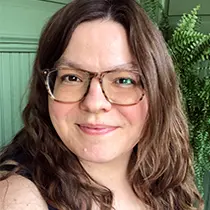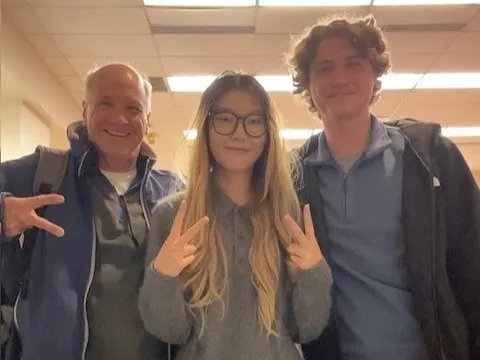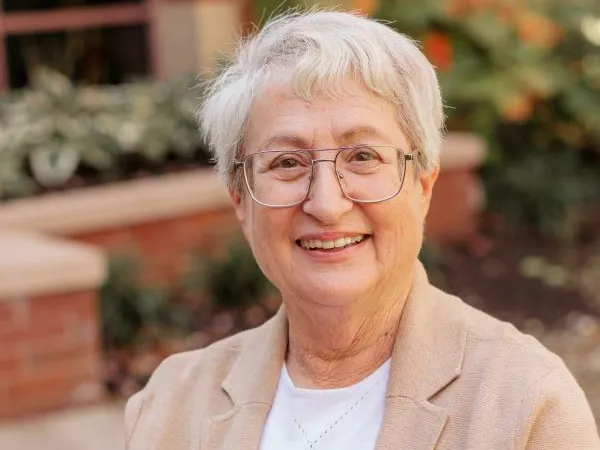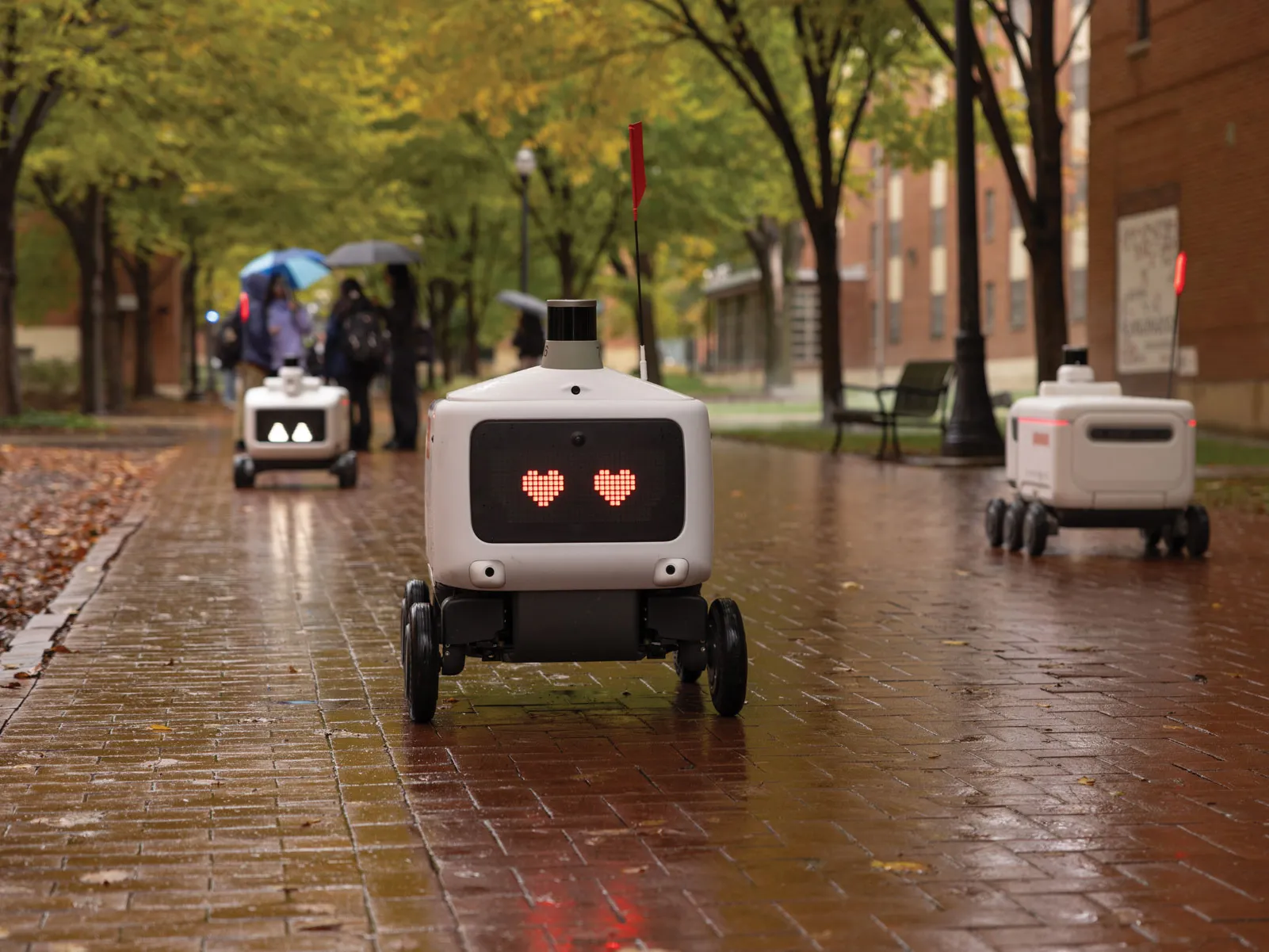Determined to improve lives, safety and empathy
By better connecting people without homes to the community, this social worker and her team are improving lives, safety and empathy.
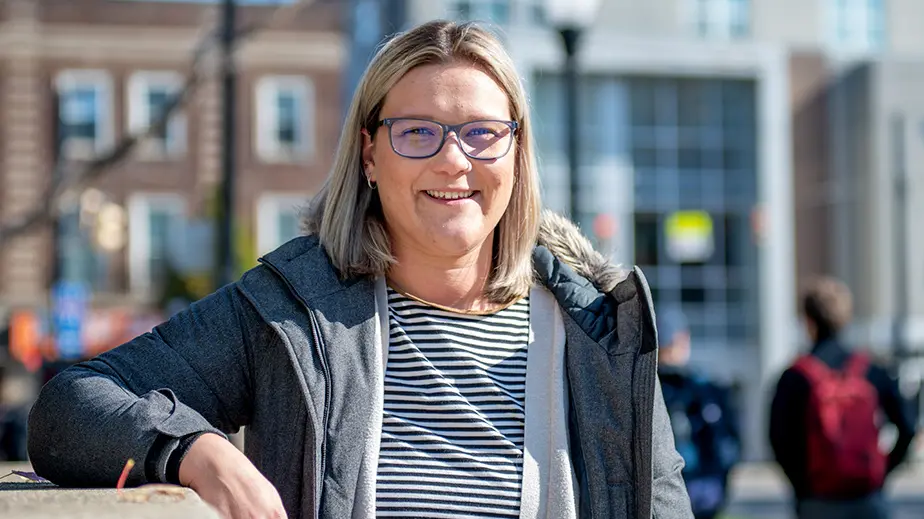
Morgan Weininger ’15, ’17 MSW and her team are working to build trust with individuals who are homeless in the University District. (Photo by Jo McCulty ‘84, ‘94 MA)
For Morgan Weininger ’15, ’17 MSW, a typical day’s work is filled with what she calls “street outreach,” or canvassing the University District to find people without homes and taking time to talk with them.
A full-time licensed independent social worker, Weininger recently was hired to provide dedicated outreach to connect individuals who are homeless to resources and support. Funding for the new position originated from The Ohio State University Task Force on Community Safety and Well-Being, formed by President Kristina M. Johnson in fall 2020.
“We’ve been getting to know everyone in the community,” Weininger says of her team of social work students.
Having a sense of community is one of many factors that contribute to safety on and around campus, says Tom Gregoire, dean of the College of Social Work.
“Early on in the conversations about safety, folks who don’t have a place to live and who are not students but regular residents of our neighborhood were perceived by some as threatening or frightening. We know better,” he says. “They’re all members of the community whom we should share the space with.”
Weininger started in her role in August through a partnership with Southeast Healthcare, the University District Organization and Ohio State. The goal is to build relationships and provide a sense of stewardship in the neighborhood. Weininger also supervises in-the-field training opportunities for students in the College of Social Work.
“A lot of the work is just engaging in relationship building with people and getting to know their needs,” says Anna Stewart, assistant director of field education for the college.
Along with addressing immediate needs such as food, warm clothing and medical treatment, Weininger and her team have conversations to see what each person needs to work toward securing employment and permanent housing, if that is their goal. Not everyone wants to be housed, something that surprised Taylor Jobe, a master’s student in the College of Social Work who works with Weininger.
“Some people have been on the streets for so many years, it’s become familiar to them. It’s what they know,” she says.
Weininger can help people get into a shelter or submit an application for rapid rehousing or Section 8 housing. She has found the biggest barrier most people face is not having forms of identification such as a birth certificate or state ID card.
“Those documents get stolen or destroyed with the weather, or they’re left behind if someone has to leave a certain area,” Weininger says. “You need all those things to rent an apartment or get a job.”
Weininger often spends time helping to secure documents, whether that’s calling the right department to send a copy or providing Southeast Healthcare’s address as a permanent address for documents to be sent.
When they go out into the community, Weininger and Jobe take a hands-off approach. They let people know they are there and available to help them connect with resources. If a person doesn’t want help, they move on.
“It’s really just having a presence so they know, there’s someone out here who cares about us and who also still sees us as a human,” Jobe says.
In the future, Weininger hopes to take part in the City of Columbus’ Alternative Response Pilot Program, which aims to provide more precise emergency responses by reducing reliance on police and fire forces when other services are better suited to resolve a situation.
“Social workers are trained in trauma-informed care and crisis intervention, so we’re able to approach someone in a way that won’t provoke them further or put them in a place that makes them feel less safe,” Weininger says.
Jobe is working on a yearlong capstone project for which she’ll visit classes and student organizations to talk about what it’s like to be homeless and explain the barriers to getting housing and employment. A big component of that work is to build empathy among students, she says.
“There are a lot of negative outlooks and stigmas around homeless populations,” Jobe says. “We are trying to humanize them. Showing empathy can make a huge difference. There are so many different ways someone may become homeless. It could happen to any of us.”
Support work like this
The Ohio State Fund for the College of Social Work provides students and faculty with resources for community outreach.
